Kathleen Jones's Blog, page 64
September 6, 2012
Living in Interesting Times
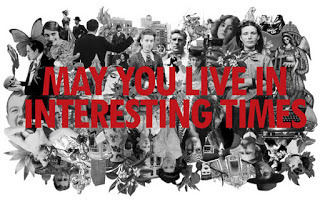
This is a lovely post by Katherine Roberts at The History Girls - a review of women's writing from cave dwellers to kindle! I couldn't resist sharing.
“May you live in interesting times” is a curse in some circles but, like it or not, authors today are living in very interesting times. There has been some wild speculation about the death of publishing as we know it, the death of printed books, the death of literature, the death of agents, and the death of professional authors (of which mine has been greatly exaggerated). But the only thing that’s really changed is the way a story gets out of the author’s head and into the reader’s head... the writing, publishing and distribution process, in other words. Because stories are the same now as they were thousands of years ago, when cavemen told tales around their campfires at night. . . . Read More
Published on September 06, 2012 03:09
September 2, 2012
David Gaughran: Manning the Barricades of the E-book Revolution
David Gaughran’s
‘Let’s Get Digital’
is a really good handbook for new indie-publishers - a morale booster and time-saver all in one. More than that, it’s a justification for what is snobbishly being referred to as ‘self-publishing’ by the establishment, in a way that somehow brackets it with Vanity publishing and brands it as crap at the same time.
‘An Army is only ever prepared for the war that’s just finished’, warns one of David Gaughran’s authors. But special forces have to envisage and prepare for the next war. David Gaughran is the digital equivalent of special forces, preparing us for a digital revolution which, he suggests, has only just begun.
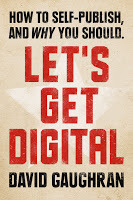 It may seem a bit far-fetched to think of what’s happening with e-books and self-publishing as a kind of war, but traditional publishing is putting up quite a fight and they don’t always fight clean. ‘We should be on the same side, working together to advance our collective interests, but sometimes self-publishers are viewed as the enemy, or wayward children that are making a terrible mistake,’ David Gaughran observes. Digital authors need to be as fully armed with information as it’s possible for them to be. That’s why he wrote the book. It’s sub-titled ‘How to Self-Publish, and Why You Should’.
It may seem a bit far-fetched to think of what’s happening with e-books and self-publishing as a kind of war, but traditional publishing is putting up quite a fight and they don’t always fight clean. ‘We should be on the same side, working together to advance our collective interests, but sometimes self-publishers are viewed as the enemy, or wayward children that are making a terrible mistake,’ David Gaughran observes. Digital authors need to be as fully armed with information as it’s possible for them to be. That’s why he wrote the book. It’s sub-titled ‘How to Self-Publish, and Why You Should’.
The Guardian are giving a lot of space to the arguments of traditional publishing at the moment in the shape of Ewan Morrison who seems to think that all self-publishers should be exterminated in the interests of literary good taste. Another article recently by US author Sue Grafton quoted her as saying that self-published authors were lazy, amateurish, and not bothering to learn their craft through years of rejection and the filtering system operated by agents and publishers.
Both commentators were woefully ill-informed. Self published authors have to work harder than others - they don’t have a big publisher to do it all for them; and many, many self-published authors have decades of professional experience behind them and could teach EM and SG a thing or two about craft. Of course there’s a lot of crap out there - but there is in traditional publishing too and it often sells better than the more ‘literary’ stuff! As for being ‘amateurish’, only the top 5% of traditionally published authors earn enough to give up the day job and ‘go professional’.
David Gaughran dedicates a lot of space to encouragement and persuasion. He gives you validation, if you need it, for self-publishing your work, and a dozen successful authors relate their reasons for going digital and share their experiences. They range from big players like Bob Mayer, to complete newbies, and yes, JA Konrath gets quoted too.
Gaughran’s message is simple - traditional, legacy publishing is doomed and he explains why. Agents and publishers had it cosy and lucrative for a long time and they were slow to recognise the challenges presented by the digital age. When cold commercial winds began to blow a few years ago they didn’t react in the right way, adopting industrial business models, going for mass market, accountant controlled publishing and allowing product quality and author development to be squeezed out. Then, when new technology arrived, they saw it as a threat and began to act defensively to defend their territory. They’ve have been consistently hostile towards e-books and self-publishing rather than working out how to join the party.
The truth is that writers and readers can now form partnerships without intermediaries. We don’t need agents and gargantuan publishing houses that eat money and move at a snail’s pace. It’s too late to reverse this process. Some traditional publishing will remain, Gaughran states, and some independent booksellers will survive, but not in their current forms. Will the last person in the building please put out the light?
He also deconstructs some of the self-publishing myths. So, there’s a lot of crap out there? ‘The idea of the poor self-published work contaminating the rest is clearly rubbish.’ The cream will always rise to the top. It’s just as easy to find a good book on Amazon as it is in any bookshop. People still find books in the same way - by telling each other. ‘Word of mouth... is the only thing that has ever sold books.’ And readers don’t care who the publisher is; ‘If you have a quality cover, a great editor, perfect formatting, and a good story, your work cannot be readily distinguished from a trade published book’.
Having demolished the myths and encouraged you to join the digital revolution he goes on to show you how. He doesn’t pretend that it’s easy and he stresses all along the way that quality really has to matter - if you’re not putting out a product that looks and reads professionally, then you shouldn’t be doing it. Cutting editorial corners is the biggest mistake a self-published author can make.
Rather than go through the whole process of showing you in tedious detail how to convert files to mobi or e-pub, Gaughran offers you the option of downloading his own guide from the internet (free) as well as an excellent step-by-step instruction booklet by Guido Henkel (also free). Both documents are regularly up-dated. Neil has already Kindled 7 books and put 2 up on Smashwords, but he says he learned a great deal from these guides - things he’d fiddled with for hours could be formatted in a couple of key strokes without resorting to bad language or being driven to the booze cupboard for inspiration.
Next, Gaughran takes you through the publicity and promotion you need to do - not the hours and hours that some doom merchants estimate - and probably no more than a legacy publisher would expect you to do. I’ve recently spent two days travelling to give a one hour talk to 30 people in a bookshop, all to please a publisher and sell maybe 10 books. A couple of hours on the internet seems economical to say the least. As well as covering the marketing angles, Gaughran also gives very good advice on the delicate business of pricing, explaining clearly how the Amazon thing works. I found pricing e-books quite difficult and was glad of his advice.
David Gaughran never hides the fact that the formatting is complicated, nor the fact that you’re going to have to invest some money in cover design and editing if you want a top quality product, but he does make you feel that it’s all worthwhile and that joining the E-book Revolution is exactly the right thing to do right now.
Neil and I wish we’d had this book when we started on the road to e-publishing. We’d have avoided a lot of pitfalls and not spent so much time agonising about doing the right thing. This is a life-changing book for digital authors. As David Gaughran says ‘It’s a great time to be a writer’!

‘An Army is only ever prepared for the war that’s just finished’, warns one of David Gaughran’s authors. But special forces have to envisage and prepare for the next war. David Gaughran is the digital equivalent of special forces, preparing us for a digital revolution which, he suggests, has only just begun.
 It may seem a bit far-fetched to think of what’s happening with e-books and self-publishing as a kind of war, but traditional publishing is putting up quite a fight and they don’t always fight clean. ‘We should be on the same side, working together to advance our collective interests, but sometimes self-publishers are viewed as the enemy, or wayward children that are making a terrible mistake,’ David Gaughran observes. Digital authors need to be as fully armed with information as it’s possible for them to be. That’s why he wrote the book. It’s sub-titled ‘How to Self-Publish, and Why You Should’.
It may seem a bit far-fetched to think of what’s happening with e-books and self-publishing as a kind of war, but traditional publishing is putting up quite a fight and they don’t always fight clean. ‘We should be on the same side, working together to advance our collective interests, but sometimes self-publishers are viewed as the enemy, or wayward children that are making a terrible mistake,’ David Gaughran observes. Digital authors need to be as fully armed with information as it’s possible for them to be. That’s why he wrote the book. It’s sub-titled ‘How to Self-Publish, and Why You Should’.The Guardian are giving a lot of space to the arguments of traditional publishing at the moment in the shape of Ewan Morrison who seems to think that all self-publishers should be exterminated in the interests of literary good taste. Another article recently by US author Sue Grafton quoted her as saying that self-published authors were lazy, amateurish, and not bothering to learn their craft through years of rejection and the filtering system operated by agents and publishers.
Both commentators were woefully ill-informed. Self published authors have to work harder than others - they don’t have a big publisher to do it all for them; and many, many self-published authors have decades of professional experience behind them and could teach EM and SG a thing or two about craft. Of course there’s a lot of crap out there - but there is in traditional publishing too and it often sells better than the more ‘literary’ stuff! As for being ‘amateurish’, only the top 5% of traditionally published authors earn enough to give up the day job and ‘go professional’.
David Gaughran dedicates a lot of space to encouragement and persuasion. He gives you validation, if you need it, for self-publishing your work, and a dozen successful authors relate their reasons for going digital and share their experiences. They range from big players like Bob Mayer, to complete newbies, and yes, JA Konrath gets quoted too.
Gaughran’s message is simple - traditional, legacy publishing is doomed and he explains why. Agents and publishers had it cosy and lucrative for a long time and they were slow to recognise the challenges presented by the digital age. When cold commercial winds began to blow a few years ago they didn’t react in the right way, adopting industrial business models, going for mass market, accountant controlled publishing and allowing product quality and author development to be squeezed out. Then, when new technology arrived, they saw it as a threat and began to act defensively to defend their territory. They’ve have been consistently hostile towards e-books and self-publishing rather than working out how to join the party.
The truth is that writers and readers can now form partnerships without intermediaries. We don’t need agents and gargantuan publishing houses that eat money and move at a snail’s pace. It’s too late to reverse this process. Some traditional publishing will remain, Gaughran states, and some independent booksellers will survive, but not in their current forms. Will the last person in the building please put out the light?
He also deconstructs some of the self-publishing myths. So, there’s a lot of crap out there? ‘The idea of the poor self-published work contaminating the rest is clearly rubbish.’ The cream will always rise to the top. It’s just as easy to find a good book on Amazon as it is in any bookshop. People still find books in the same way - by telling each other. ‘Word of mouth... is the only thing that has ever sold books.’ And readers don’t care who the publisher is; ‘If you have a quality cover, a great editor, perfect formatting, and a good story, your work cannot be readily distinguished from a trade published book’.
Having demolished the myths and encouraged you to join the digital revolution he goes on to show you how. He doesn’t pretend that it’s easy and he stresses all along the way that quality really has to matter - if you’re not putting out a product that looks and reads professionally, then you shouldn’t be doing it. Cutting editorial corners is the biggest mistake a self-published author can make.
Rather than go through the whole process of showing you in tedious detail how to convert files to mobi or e-pub, Gaughran offers you the option of downloading his own guide from the internet (free) as well as an excellent step-by-step instruction booklet by Guido Henkel (also free). Both documents are regularly up-dated. Neil has already Kindled 7 books and put 2 up on Smashwords, but he says he learned a great deal from these guides - things he’d fiddled with for hours could be formatted in a couple of key strokes without resorting to bad language or being driven to the booze cupboard for inspiration.
Next, Gaughran takes you through the publicity and promotion you need to do - not the hours and hours that some doom merchants estimate - and probably no more than a legacy publisher would expect you to do. I’ve recently spent two days travelling to give a one hour talk to 30 people in a bookshop, all to please a publisher and sell maybe 10 books. A couple of hours on the internet seems economical to say the least. As well as covering the marketing angles, Gaughran also gives very good advice on the delicate business of pricing, explaining clearly how the Amazon thing works. I found pricing e-books quite difficult and was glad of his advice.
David Gaughran never hides the fact that the formatting is complicated, nor the fact that you’re going to have to invest some money in cover design and editing if you want a top quality product, but he does make you feel that it’s all worthwhile and that joining the E-book Revolution is exactly the right thing to do right now.
Neil and I wish we’d had this book when we started on the road to e-publishing. We’d have avoided a lot of pitfalls and not spent so much time agonising about doing the right thing. This is a life-changing book for digital authors. As David Gaughran says ‘It’s a great time to be a writer’!
Published on September 02, 2012 10:43
August 30, 2012
Someone Else's Kobo
 Neil's small
'Book Mill' e-publishing imprint
, is about to start publishing on Kobo, which needs a different format to the Kindle (e-pub rather than mobi - for the technically minded!). So, we thought we ought to buy one to see how the books look on it and what kind of functions we need to put into them. There's no standardisation in e-publishing - a cover that's the right size for Kindle will leak over onto another page on a Kobo, but be too small for an I-pad. Hyperlinks that work on the Kindle, won't on Kobo. An e-publisher needs to know what they're dealing with.
Neil's small
'Book Mill' e-publishing imprint
, is about to start publishing on Kobo, which needs a different format to the Kindle (e-pub rather than mobi - for the technically minded!). So, we thought we ought to buy one to see how the books look on it and what kind of functions we need to put into them. There's no standardisation in e-publishing - a cover that's the right size for Kindle will leak over onto another page on a Kobo, but be too small for an I-pad. Hyperlinks that work on the Kindle, won't on Kobo. An e-publisher needs to know what they're dealing with.To it was off to WH Smith to buy a Kobo. Neil took the dummy box off the rack and took it to the counter - the assistant went upstairs and came down with the same box, though this time filled with a Kobo, put it through the till and into a bag. But when Neil got home and took the Kobo out, it was covered with fingerprints, the sticky plastic on the screen was crumpled as if it had been taken off and put on again and it had obviously been used. Back to the shop. The assistant apologised, popped upstairs, came down half an hour later with the same box but - we were assured - a new Kobo inside.
Home again and unpacked the Kobo from its box and discovered that the sticky plastic over the screen wasn't smooth and the handbook with it had been well-thumbed. Suspicious we turned the device on according to the instructions and the set-up menu failed to appear as it was supposed to do. When we finally got into the settings we discovered that that was because it had already been set up by someone else and their email address and details were on the Kobo, dated almost a year ago, so presumably the device had been returned to the shop by its owner.
Back to WH Smith again (a round trip of nearly 80 miles!) to ask for a new Kobo please, not another second hand one. This time it was the manager we saw, who told us that - whoops! - they didn't have any new Kobos in stock. Deeply apologetic. Money back time. The staff couldn't have been nicer, and - since we were bent on buying a Kobo somewhere, somehow - we were given a cover at a very reduced price to offset our fuel costs for the 2 return visits.
What made it so disquieting for us what that daughter M had bought a Kobo in London last year for her job and exactly the same thing had happened to her - someone else's details were already logged in and she had to take the device back to the shop.
We now have a Kobo, bought in Staples - it came in a sealed box and was absolutely pristine. New, definitely! And we love it. The touch colour Vox has a vibrant screen to show off illustrations and all the apps, bells and whistles you get on a top of the range smart phone or tablet computer. It's a little short on battery life (7 hours), rather like a laptop, but the books look amazing. You can vary the fonts for publishing (you can't on Kindle) and have a much more elegant book. Newspapers and magazines look exactly the same on screen as they do in your hand - and, in full colour, cookery books are luscious. In fact, reading on Kobo is a fantastic experience. Wish we could recommend WH Smith in the same way.
Published on August 30, 2012 06:30
August 28, 2012
The Arctic Ice Melt
The extreme weather conditions we've been experiencing in the UK and Italy - caused apparently by a freak jet stream position - are explained in a
Guardian article by George Monbiot.
What it says is chilling and it agrees with the known facts. This isn't scare-mongering. It's real. But it also makes me feel very helpless. What can any of us do in the face of global commercial and governmental interests?
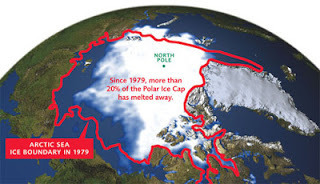


Published on August 28, 2012 12:25
August 26, 2012
A Mutant Sparrow on the way to Bruges
So, phew, we're back in the UK at the Mill, just in time for some really bad weather. The drive through Europe wasn't too bad. Leaving Italy at 7 in the morning on Thursday in temperatures already over 30, by lunch time we were in Switzerland where the air was slightly cooler. We stopped for a quick picnic lunch beside the road (everything is expensive in Switzerland, so we don't hang about) and then saw a very strange bird hopping towards us intent on the crumbs from our baguette.
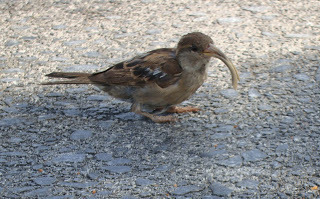
This is the avian equivalent of the elephant man. We wondered what accident had caused this overgrowth of the beak, or whether it was genetic - given that something was also wrong with the sparrow's legs. But it seemed to be able to pick up bread by turning its head to the side and laying the beak down on the table. I found it quite disturbing.
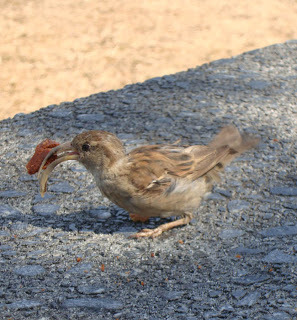
We stayed overnight in a small French town called St Avold, which was cheap and had nice wine and pastries, and then set off very early in the morning towards the Zeebrugge ferry, aiming to be at Bruges for lunch so that we could spend an afternoon walking round this medieval gem.
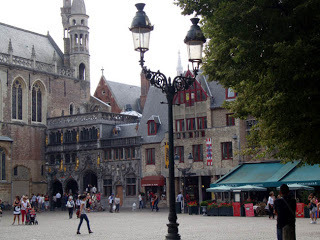
Bruges is a marvellous place - I spent so much time looking I forgot to take photographs of the narrow streets with their step-front houses on the canal front. It's just a bit touristy, but lovely all the same. I did take this snap from the pub where we had lunch.

It must be one of the most beautiful places in Europe.

Then we headed for the ferry and an overnight crossing of the north sea. We left sunny Belgium and woke up to find the refineries and power stations of Humberside off the port bow. Hull, or hell? We really didn't know. How are we supposed to live with this level of pollution (which I suppose we've just added to by driving through Europe)? As for the weather - the grey sky says it all!



This is the avian equivalent of the elephant man. We wondered what accident had caused this overgrowth of the beak, or whether it was genetic - given that something was also wrong with the sparrow's legs. But it seemed to be able to pick up bread by turning its head to the side and laying the beak down on the table. I found it quite disturbing.

We stayed overnight in a small French town called St Avold, which was cheap and had nice wine and pastries, and then set off very early in the morning towards the Zeebrugge ferry, aiming to be at Bruges for lunch so that we could spend an afternoon walking round this medieval gem.

Bruges is a marvellous place - I spent so much time looking I forgot to take photographs of the narrow streets with their step-front houses on the canal front. It's just a bit touristy, but lovely all the same. I did take this snap from the pub where we had lunch.

It must be one of the most beautiful places in Europe.

Then we headed for the ferry and an overnight crossing of the north sea. We left sunny Belgium and woke up to find the refineries and power stations of Humberside off the port bow. Hull, or hell? We really didn't know. How are we supposed to live with this level of pollution (which I suppose we've just added to by driving through Europe)? As for the weather - the grey sky says it all!

Published on August 26, 2012 11:39
August 22, 2012
Just off to England - too far, too hot.
Packing madly and cleaning the house (the landlady might come in while I'm away and discover what a slut I am!) before climbing into a very hot car for a very long, hot journey north. It's 800 miles or more to the ferry in Zeebrugge and will take us two days in this heat. We have an old car and think it should take things gently! Then overnight on the ferry to Hull and back at the mill (we hope) by Saturday afternoon. It's a nuisance that the car has to have UK papers, MOTs and things, once a year - in Europe they do it every two years, which would make our life much easier. But EU MOT's are not recognised in Britain. How dumb is that?
Meanwhile, my short biography of Margaret Forster, exploring her books against the background of her life during a publishing career spanning forty years, has just appeared as an illustrated E-book. It's a complete re-write,(quadrupled in size, illustrated and up-dated), of an arts council pamphlet I wrote in 2003. Hopefully it should appeal to Margaret Forster's fans, as it has interviews and behind-the-scenes glimpses of the way the books were conceived and developed, as well as pics of her book covers etc. We plan a print edition in the autumn. This is what the E-book looks like:-
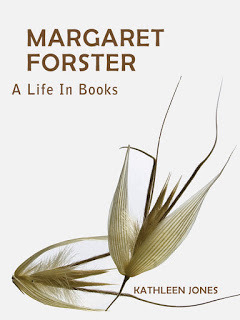
And The Book Mill now has a Facebook Page all of its own to post news and anything of interest to Indie-authors.
See you all on Saturday if we don't break down on the way!

Meanwhile, my short biography of Margaret Forster, exploring her books against the background of her life during a publishing career spanning forty years, has just appeared as an illustrated E-book. It's a complete re-write,(quadrupled in size, illustrated and up-dated), of an arts council pamphlet I wrote in 2003. Hopefully it should appeal to Margaret Forster's fans, as it has interviews and behind-the-scenes glimpses of the way the books were conceived and developed, as well as pics of her book covers etc. We plan a print edition in the autumn. This is what the E-book looks like:-

And The Book Mill now has a Facebook Page all of its own to post news and anything of interest to Indie-authors.
See you all on Saturday if we don't break down on the way!
Published on August 22, 2012 06:53
August 20, 2012
Tuesday Poem: Julia Copus - The World's Two Smallest Humans
Inkling
Last night I sensed a taking root
under the bonecage of my heart,
a stirring, shifting; something not
quite of a breath or heartbeat's weight.
It was the inkling of a soul.
Now I shall have no peace at all
till he's caught and fastened, nested in
the cradle of my pelvic bone.
Then, in the coracle of my womb,
I'll carry him gently, every inch home
though the hour is late
in the lengthening light
to the crook of my arm, the bay's curved shore,
water-lapped, twi-lit, secure.
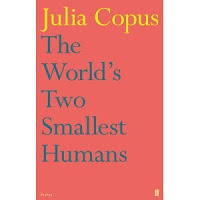 This collection
begins with a quote from Hilary Mantel: 'What is to be done with the lost .... but write them into being.' All writing is, as Margaret Atwood observed, 'negotiating with the dead' - descending into Hades like Orpheus and bringing back the lost. Many of these poems deal with loss and longing - the man who stands in the garden, 'earth-bound, heart-sore, his boots in the /frost-stiffened grass, travelling eastwards, against a background of stars'; Heloise and Abelard, Dido (Julia Copus is a classicist). One of my favourites from the collection is a poem called 'This is the poem in which I have not left you', which rewinds time to the moment when, lying in bed, she hears the bird in the garden calling 'do it, do it'.
This collection
begins with a quote from Hilary Mantel: 'What is to be done with the lost .... but write them into being.' All writing is, as Margaret Atwood observed, 'negotiating with the dead' - descending into Hades like Orpheus and bringing back the lost. Many of these poems deal with loss and longing - the man who stands in the garden, 'earth-bound, heart-sore, his boots in the /frost-stiffened grass, travelling eastwards, against a background of stars'; Heloise and Abelard, Dido (Julia Copus is a classicist). One of my favourites from the collection is a poem called 'This is the poem in which I have not left you', which rewinds time to the moment when, lying in bed, she hears the bird in the garden calling 'do it, do it'.
But I bought the collection for a sequence of poems called 'Ghost' , about the experience of IVF treatment, which I first heard on BBC radio - a programme that was short-listed for the Ted Hughes award for new work in poetry. 'Inkling' is one of the poems in that sequence - they are lyrical poems that go to the bone.
Highly recommended. You may be able to listen to it as a podcast, or on i-player, on this BBC link.
For more Tuesday Poems from round the world, please go to the Tuesday Poem website and check out the side-bar for more contributions.

Last night I sensed a taking root
under the bonecage of my heart,
a stirring, shifting; something not
quite of a breath or heartbeat's weight.
It was the inkling of a soul.
Now I shall have no peace at all
till he's caught and fastened, nested in
the cradle of my pelvic bone.
Then, in the coracle of my womb,
I'll carry him gently, every inch home
though the hour is late
in the lengthening light
to the crook of my arm, the bay's curved shore,
water-lapped, twi-lit, secure.
 This collection
begins with a quote from Hilary Mantel: 'What is to be done with the lost .... but write them into being.' All writing is, as Margaret Atwood observed, 'negotiating with the dead' - descending into Hades like Orpheus and bringing back the lost. Many of these poems deal with loss and longing - the man who stands in the garden, 'earth-bound, heart-sore, his boots in the /frost-stiffened grass, travelling eastwards, against a background of stars'; Heloise and Abelard, Dido (Julia Copus is a classicist). One of my favourites from the collection is a poem called 'This is the poem in which I have not left you', which rewinds time to the moment when, lying in bed, she hears the bird in the garden calling 'do it, do it'.
This collection
begins with a quote from Hilary Mantel: 'What is to be done with the lost .... but write them into being.' All writing is, as Margaret Atwood observed, 'negotiating with the dead' - descending into Hades like Orpheus and bringing back the lost. Many of these poems deal with loss and longing - the man who stands in the garden, 'earth-bound, heart-sore, his boots in the /frost-stiffened grass, travelling eastwards, against a background of stars'; Heloise and Abelard, Dido (Julia Copus is a classicist). One of my favourites from the collection is a poem called 'This is the poem in which I have not left you', which rewinds time to the moment when, lying in bed, she hears the bird in the garden calling 'do it, do it'.But I bought the collection for a sequence of poems called 'Ghost' , about the experience of IVF treatment, which I first heard on BBC radio - a programme that was short-listed for the Ted Hughes award for new work in poetry. 'Inkling' is one of the poems in that sequence - they are lyrical poems that go to the bone.
Highly recommended. You may be able to listen to it as a podcast, or on i-player, on this BBC link.
For more Tuesday Poems from round the world, please go to the Tuesday Poem website and check out the side-bar for more contributions.
Published on August 20, 2012 15:01
August 17, 2012
Ulysses, Caligula and the Madonna of the Rock
Wednesday was Ferragosto - the biggest festival in the Italian calendar. Everyone was on holiday and sharing a gigantic meal in the evening. Ferragosto is the Assumption of the Virgin Mary into heaven, but before Christianity it was dedicated to Diana, goddess, huntress, and long before that to other goddesses of fertility and plenty. It's the middle of summer here, the trees loaded with fruit, and the heat beating off the walls and the scorched ground like a furnace.
Ferragosto was also my birthday, so we lazed around, went for a dip in the murky Mediterranean in late afternoon, and then for dinner in our village Osteria.
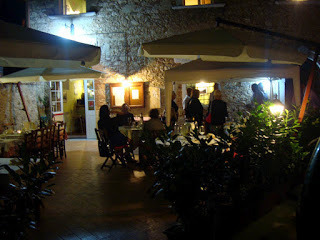
The sea was murky because we're in the grip of rampant anti-cyclones circling up from Africa, laden with dust and desert heat. First, Ulysses with temperatures up to 38 degrees, now Caligula who is not much cooler, and tomorrow we get the Colossus of the Desert with warnings of temps in excess of 40 degrees over most of Europe. Bad news for city dwellers and anyone at risk of wildfires.
Last night, as we sat on the terrace with a friend savouring the late evening breeze off the sea, we heard music and chanting from the direction of the village. It appeared to be coming along the road that passes above our house. We walked up the path, just in time to find a candle-lit procession, headed by priests and our local orchestra, the Capezzano Philarmonic. A wood and plaster image of Jesus was mounted on the back of a pick-up truck and followed by a long file of women and children carrying candles. Difficult to get any kind of photograph because of the darkness and the glaring lights that illuminated the icon.
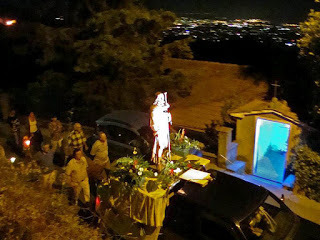
We followed it to the bend in the road near our house (which we privately call 'Holy Corner') where there is a big shrine carved into the rock with a statue of the Virgin Mary and an inscription that translates 'to a world guilty and sad, oh immaculate Queen, give forgiveness and peace'.
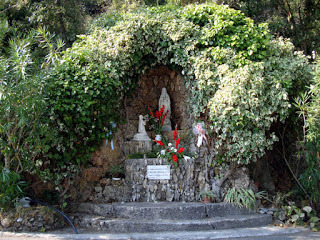
She is the Madonna of the Rock. The carved image of her son stopped in front of the shrine and he was turned to face it. Prayers were chanted and sung. It was all very moving and very pagan in the dark with only the flickering candles and the murmuring voices of the women around me.
Then the procession turned and walked back to the village church where the bells were rung. Almost midnight by now. But a beautiful end to the day.
Thanks to everyone who contributed advice on titles and covers. We now have a cover and a title that we're very pleased with! All will be revealed later.

Ferragosto was also my birthday, so we lazed around, went for a dip in the murky Mediterranean in late afternoon, and then for dinner in our village Osteria.

The sea was murky because we're in the grip of rampant anti-cyclones circling up from Africa, laden with dust and desert heat. First, Ulysses with temperatures up to 38 degrees, now Caligula who is not much cooler, and tomorrow we get the Colossus of the Desert with warnings of temps in excess of 40 degrees over most of Europe. Bad news for city dwellers and anyone at risk of wildfires.
Last night, as we sat on the terrace with a friend savouring the late evening breeze off the sea, we heard music and chanting from the direction of the village. It appeared to be coming along the road that passes above our house. We walked up the path, just in time to find a candle-lit procession, headed by priests and our local orchestra, the Capezzano Philarmonic. A wood and plaster image of Jesus was mounted on the back of a pick-up truck and followed by a long file of women and children carrying candles. Difficult to get any kind of photograph because of the darkness and the glaring lights that illuminated the icon.

We followed it to the bend in the road near our house (which we privately call 'Holy Corner') where there is a big shrine carved into the rock with a statue of the Virgin Mary and an inscription that translates 'to a world guilty and sad, oh immaculate Queen, give forgiveness and peace'.

She is the Madonna of the Rock. The carved image of her son stopped in front of the shrine and he was turned to face it. Prayers were chanted and sung. It was all very moving and very pagan in the dark with only the flickering candles and the murmuring voices of the women around me.
Then the procession turned and walked back to the village church where the bells were rung. Almost midnight by now. But a beautiful end to the day.
Thanks to everyone who contributed advice on titles and covers. We now have a cover and a title that we're very pleased with! All will be revealed later.
Published on August 17, 2012 09:42
August 11, 2012
The Novel Without a Title - want to win a book?
The most important things, when it comes to selling a book, are the cover and the title.(Read
Debbie Bennet
on the subject) Which gives me a terrible headache - because I've got a novel that everyone seems to like (it's just spent six months in the top five of the 'best-seller' charts on YouWriteOn.com) but I haven't got a title - and until I have a title, it's very difficult to have a cover. So I thought I'd have a competition - whoever comes up with the 'right' title, will win a free copy of any book I've ever written as well as a free copy of the novel when it's published.
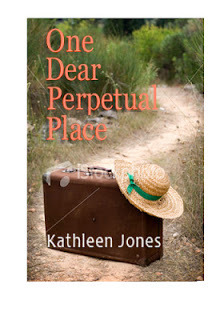 Cover 1The novel features two girls growing up in the 1930s. They meet by chance at a school in the north east of England and form a friendship that lasts through bereavement, failed relationships, internment camps and all the day to day discomforts of wartime Britain. They are very different - Tamar is quiet and reserved, having been dragged from lodging house to lodging house all her life by her itinerant mother - the beautiful and unreliable Sadie. Anna is more forceful, half German, determined to study art and become a painter. Her mother leaves Germany as soon as things become difficult, separating Anna from her father and grandparents against her will. Both girls are constantly seeking a place where they feel they can belong and the war takes them to some unexpected destinations.
Cover 1The novel features two girls growing up in the 1930s. They meet by chance at a school in the north east of England and form a friendship that lasts through bereavement, failed relationships, internment camps and all the day to day discomforts of wartime Britain. They are very different - Tamar is quiet and reserved, having been dragged from lodging house to lodging house all her life by her itinerant mother - the beautiful and unreliable Sadie. Anna is more forceful, half German, determined to study art and become a painter. Her mother leaves Germany as soon as things become difficult, separating Anna from her father and grandparents against her will. Both girls are constantly seeking a place where they feel they can belong and the war takes them to some unexpected destinations.
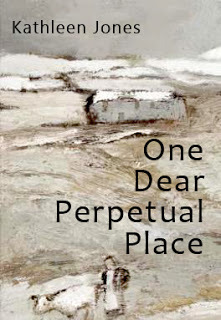 Cover 2
Cover 2
One of my suggested titles is 'One Dear Perpetual Place' (from WB Yeats Prayer for my Daughter), but some think it's a bit pretentious.
I wanted to call it 'The Waters and the Wild' (a quote from Yeats that is the epigraph for the book), but someone has beaten me to it with a Teen novel. I could have 'Between the Water and the Wild', but don't like it as much.
'The Stolen Child' has also been suggested, as both girls have in a sense been 'stolen' from their fathers. But I think it would lead readers to expect a thriller, and it isn't.
'Where the North Wind Blows' is another contender, but I'm not sure about it. The working title was 'Travelling North' - which is inadequate. Then there is 'The Befriending of Tamar Fell', though the novel is also about Anna.
'The Hat Box' is another suggestion, since that is where Sadie keeps the papers that will reveal the secrets of Tamar's family history.
Any votes? Any ideas? Neil has put together some draft covers, some of which I like, but it's difficult not having a title!
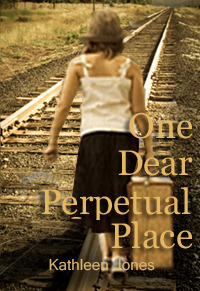 Cover 3
Cover 3
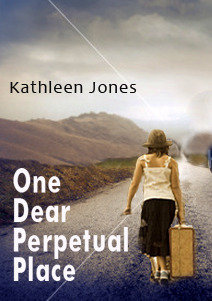 Cover 4
Cover 4

 Cover 1The novel features two girls growing up in the 1930s. They meet by chance at a school in the north east of England and form a friendship that lasts through bereavement, failed relationships, internment camps and all the day to day discomforts of wartime Britain. They are very different - Tamar is quiet and reserved, having been dragged from lodging house to lodging house all her life by her itinerant mother - the beautiful and unreliable Sadie. Anna is more forceful, half German, determined to study art and become a painter. Her mother leaves Germany as soon as things become difficult, separating Anna from her father and grandparents against her will. Both girls are constantly seeking a place where they feel they can belong and the war takes them to some unexpected destinations.
Cover 1The novel features two girls growing up in the 1930s. They meet by chance at a school in the north east of England and form a friendship that lasts through bereavement, failed relationships, internment camps and all the day to day discomforts of wartime Britain. They are very different - Tamar is quiet and reserved, having been dragged from lodging house to lodging house all her life by her itinerant mother - the beautiful and unreliable Sadie. Anna is more forceful, half German, determined to study art and become a painter. Her mother leaves Germany as soon as things become difficult, separating Anna from her father and grandparents against her will. Both girls are constantly seeking a place where they feel they can belong and the war takes them to some unexpected destinations. Cover 2
Cover 2 One of my suggested titles is 'One Dear Perpetual Place' (from WB Yeats Prayer for my Daughter), but some think it's a bit pretentious.
I wanted to call it 'The Waters and the Wild' (a quote from Yeats that is the epigraph for the book), but someone has beaten me to it with a Teen novel. I could have 'Between the Water and the Wild', but don't like it as much.
'The Stolen Child' has also been suggested, as both girls have in a sense been 'stolen' from their fathers. But I think it would lead readers to expect a thriller, and it isn't.
'Where the North Wind Blows' is another contender, but I'm not sure about it. The working title was 'Travelling North' - which is inadequate. Then there is 'The Befriending of Tamar Fell', though the novel is also about Anna.
'The Hat Box' is another suggestion, since that is where Sadie keeps the papers that will reveal the secrets of Tamar's family history.
Any votes? Any ideas? Neil has put together some draft covers, some of which I like, but it's difficult not having a title!
 Cover 3
Cover 3 Cover 4
Cover 4
Published on August 11, 2012 15:30
August 10, 2012
The Edinburgh E-Book Festival
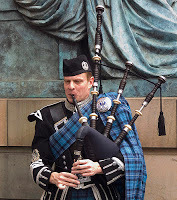 The
Edinburgh E-book
festival goes live today, Saturday 11th of August. Take a look at the shenanigans! I will be traveling on trains and planes again, but will be participating as soon as my feet touch firm ground again.
The
Edinburgh E-book
festival goes live today, Saturday 11th of August. Take a look at the shenanigans! I will be traveling on trains and planes again, but will be participating as soon as my feet touch firm ground again. You can keep in touch via the blog, or Twitter, #edebookfest, or Facebook, festivals@edinburgh - take your pick now there's no Olympics to distract you. And if you're on holiday, you might just find a really good holiday read on your E-reader. Best of all (sorry Cally!) there are NO BAGPIPES!!!!
Published on August 10, 2012 23:00



